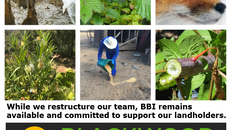Rabbit Control Calicivirus RHDV1-K5 Release Program
- Oct 23, 2021
- 3 min read
Updated: Feb 10, 2022

DO YOU HAVE A RABBIT PROBLEM AT YOUR PROPERTY?
BBI is currently in the process of conducting targeted Calicivirus RHDV1-K5 (“K5”) releases with participating landholders across our region. is in will conduct targeted Calicivirus RHDV1-K5 (“K5”) releases with participating landholders across our operational areas during the 2021-2022 summer season as part of an integrated approach to optimise control of feral rabbits.
All landholders within our operational area are welcome to participate With participation from landholders from the Shires of Boyup Brook, Bridgetown-Greenbushes, Donnybrook-Balingup and West Arthur, BBI is progressing with a wide-scale rabbit control program, which approaches rabbit management with the integrated use of a variety of tools and strategies, including the RHDV1 K5 virus. Those who have already registered for this program will be contacted with program updates specific to their participation. If you have not already contacted the group, landholders are encouraged to register by contacting BBI directly by phone or e-mail. Reports of rabbit populations or suspected signs of disease can also be forwarded to the group.
Link up with neighbours to organise a coordinated release and increase the success of the release across the community. With community members working together, significant decrease in numbers can be achieved.
Rabbits reproduce rapidly, cause significant damage to properties, compete with native animals for food and shelter and provide easy prey for abundant populations of cats and foxes. While the “K5” releases won’t eliminate all rabbits, they do provide for a significant reduction in rabbit population, hopefully better enabling landholders the ability to implement other rabbit control strategies around their property.
Rabbits as Pests - Rabbits are a declared pest that cause damage to property and the environment. Each year rabbits cause an estimated $600 million worth of damage to agriculture, as well as cause serious erosion problems, prevent native vegetation from regenerating, attack domestic gardens and undermine farm sheds and other buildings. They are also a major threat to biodiversity, impacting on the survival of many native species. High numbers of rabbits also support a higher level of feral cat and fox numbers, thereby increasing the impact that these species have on native species.
Why Wait Until Summer to Commence the Virus Release Program? The main breeding season of rabbits in our area extends from about May to November depending on availability of suitable green feed. We halt our virus releases at this time, due to the abundance of green plants for rabbits to eat, making them less likely to want our baited oats and more significantly because releasing during breeding season can make the future generations of local rabbits immune to the “K5” virus compromising this control method.
The “K5” VIRUS ONLY AFFECTS RABBITS. It is safe to pets and wildlife. The “K5″ strain of the Rabbit Haemorrhagic Disease Virus (RHDV1) which is used specifically for the control of rabbits, specifically affects rabbits. Other species, even pets that ingest infected rabbits, are not affected by the virus. An effective vaccination to protect pet rabbits against this strain of the Calicivirus is available from veterinarians. Veterinarians in our area were notified in 2020 of this planned program to enable them to advise owners of pet rabbits. It is important however to clarify that other strains of this virus not protected by the vaccine can also be present in the region. For more information about the virus, please click on the following link: WA Dept of Agriculture Rabbit Control: RHDV1 K5
Blackwood Biosecurity Inc (BBI) assists landholders within our operational area with integrated management of rabbits with a variety of tools, so have a chat with us to see what is best for you and your property.
QUESTIONS OR WISH TO DISCUSS? If you have questions or wish to discuss, please e-mail us at: info@blackwoodbiosecurity.org.au or ring us on 0477 049 967.
















Comments